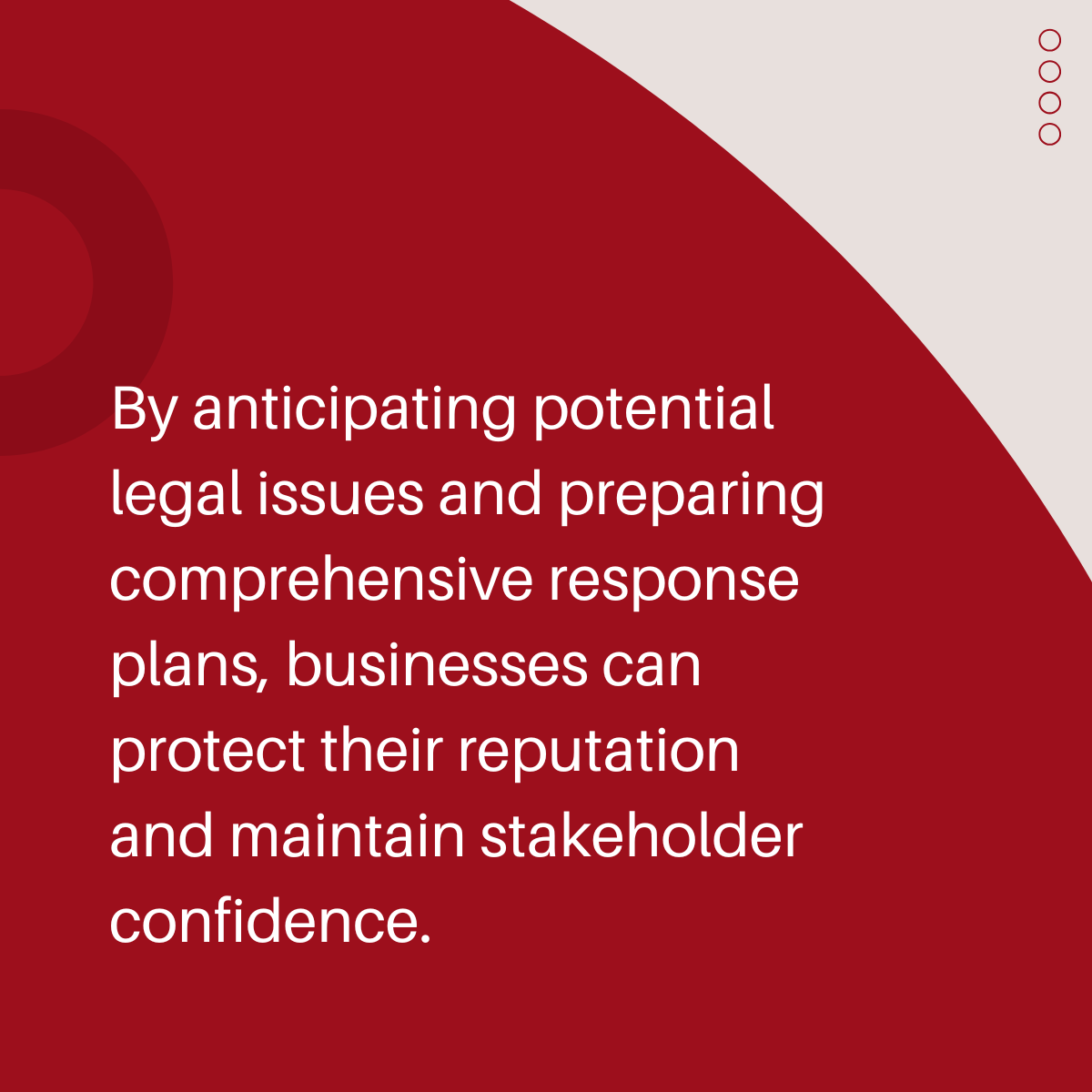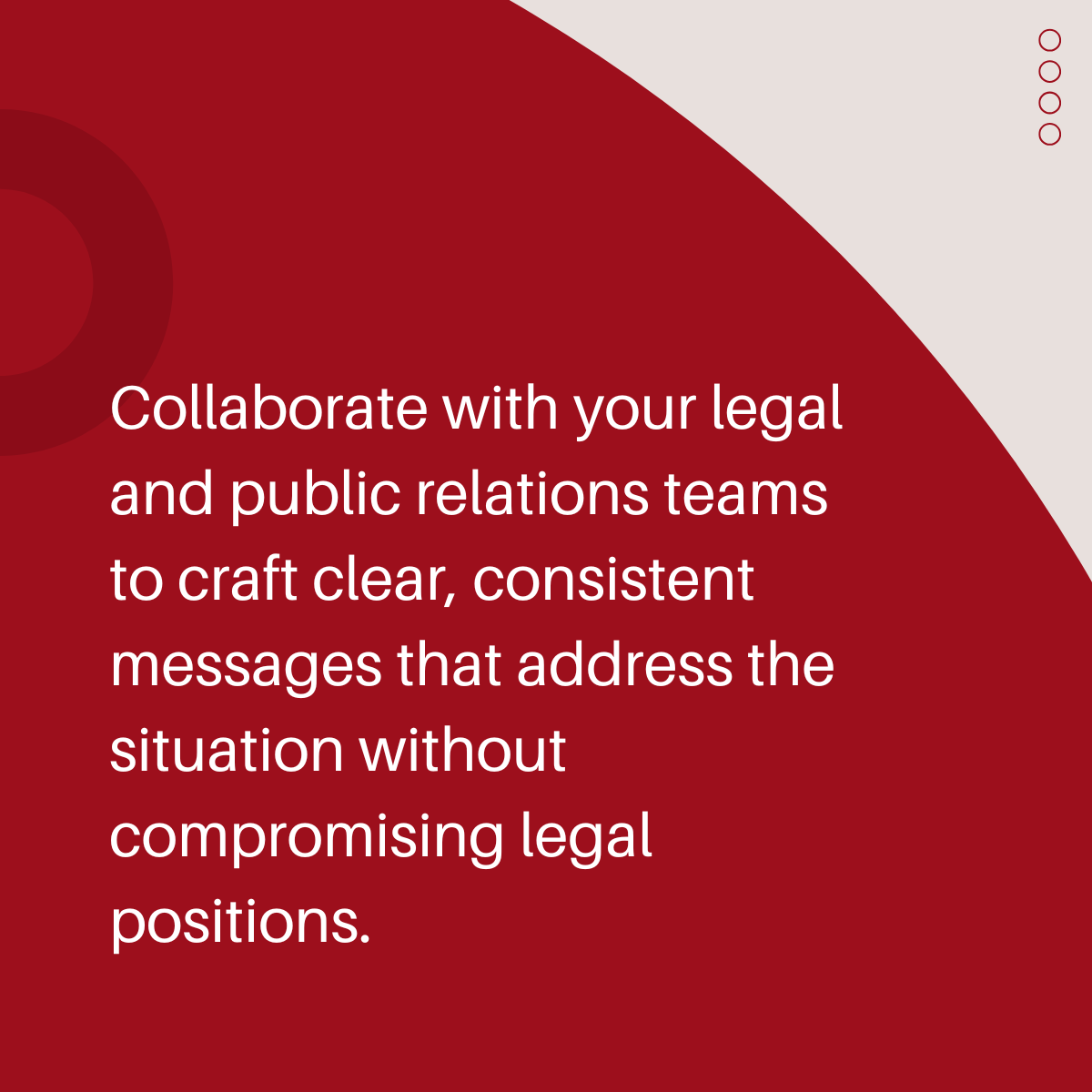
How to Protect Your Reputation During Business Lawsuits
THE INFORMATION INCLUDED IN THIS BLOG POST IS FOR INFORMATIONAL PURPOSES ONLY AND DOES NOT CONSTITUTE ADVERTISING, A SOLICITATION, OR LEGAL ADVICE, AND SHOULD NOT REPLACE YOUR CONSULTATION WITH A LAWYER CONCERNING YOUR PARTICULAR NEEDS.
Facing a lawsuit can be one of the most challenging experiences for any company. Beyond the immediate legal and financial implications, litigation can affect a business’s reputation, influencing public perception, customer trust, and future opportunities. The mere association with legal disputes can deter potential clients and partners, disrupt operations, and tarnish the hard-earned image of a brand.
Proactively implementing legal and communication strategies is essential to address these challenges. By anticipating potential legal issues and preparing comprehensive response plans, businesses can protect their reputation and maintain stakeholder confidence.
Common Lawsuits Businesses Face
When operating businesses, it is inevitable to go through various legal challenges. Understanding the most common types of lawsuits may help in implementing preventive measures to protect your business reputation. Here are some usual legal disputes businesses often encounter:
1. Breach of Contract
Disagreements over the terms or execution of contracts are frequent. These disputes arise when one party fails to fulfill their contractual obligations, which could lead to potential financial losses and strained business relationships. Engaging good business lawyers can help draft clear contracts and provide remedies in case of breaches.
2. Employment Disputes
Issues between employers and employees can lead to lawsuits, including:
- Discrimination Claims: Allegations based on race, gender, age, or disability.
- Wage and Hour Disputes: Concerns over unpaid wages or overtime.
- Harassment Claims: Accusations of a hostile work environment.
Such lawsuits can damage a company’s brand reputation and result in financial penalties. Implementing comprehensive business law policies and consulting with a business lawyer can help mitigate these risks.
3. Intellectual Property (IP) Infringement
Protecting IP is crucial. Businesses may face lawsuits over:
- Trademark Infringement: Unauthorized use of a brand’s logo or name.
- Copyright Violations: Using protected content without permission.
- Patent Disputes: Unauthorized use of patented technology or processes.
These issues can lead to costly legal battles and impact brand integrity. Proactively securing IP rights and consulting with legal professionals can help protect your business reputation.
4. Torts
Businesses can be held liable for civil wrongdoings, including:
- Negligence: Failing to exercise reasonable care, leading to injury or damage.
- Product Liability: Selling defective products that cause harm.
- Defamation: Making false statements that harm another’s reputation.

5. Partnership and Shareholder Disputes
Conflicts among business owners or shareholders can lead to legal action over:
- Profit Sharing: Disagreements on distribution of earnings.
- Business Direction: Clashes over the company’s strategic decisions.
- Breach of Fiduciary Duty: Allegations that a partner acted against the company’s best interests.
Such disputes can disrupt operations and may require legal intervention to resolve. Having clear agreements and consulting with a business lawyer can help with these challenges.
6. Regulatory Compliance Issues
Non-compliance with industry regulations can result in lawsuits. Violations can lead to fines, sanctions, and legal challenges. Regular compliance audits and working with good business lawyers can help ensure adherence to applicable laws.
7. Consumer Protection Claims
Businesses may face lawsuits from consumers alleging:
- False Advertising: Misleading claims about products or services.
- Privacy Violations: Mishandling or unauthorized sharing of personal information.
- Defective Products: Selling goods that cause harm or do not meet safety standards.
Such claims can lead to class-action lawsuits and financial liabilities. Maintaining transparent business practices and consulting with business law professionals can help protect your brand reputation.
How to Respond to a Lawsuit While Protecting Your Reputation
Facing a lawsuit presents significant challenges, not only legally and financially but also to your business’s reputation. Implementing a strategic response is crucial to safeguard your brand’s integrity during such times.
1. Get Legal Advice
Upon receiving a lawsuit, promptly consult with a seasoned business law attorney. Their expertise can help you in representing your interests, and advising on potential actions like negotiating a settlement or preparing for trial.
2. Develop a Strategic Communication Plan
Collaborate with your legal and public relations teams to craft clear, consistent messages that address the situation without compromising legal positions. This approach helps control the narrative and mitigates potential damage to your brand reputation.
3. Consider Alternative Dispute Resolution (ADR)
Explore mediation or arbitration, as these methods could be helpful in resolving disputes more quietly and efficiently than traditional litigation. ADR can prevent the negative publicity that sometimes accompanies a trial, thereby protecting your business’s public image.

4. Maintain Internal Transparency
Keep your employees informed about the situation to prevent misinformation and maintain morale. An internal communication plan ensures that staff receive accurate updates, fostering a unified and supportive work environment during challenging times.
5. Monitor Public Perception
Regularly assess public sentiment regarding the lawsuit and your company’s response. Utilize media monitoring tools to track coverage and social media discussions, enabling you to address concerns promptly and adjust your communication strategy as needed.
6. Uphold Ethical Standards
Demonstrating integrity throughout the legal process reinforces your commitment to ethical business practices. Admitting mistakes, if any, and outlining steps for improvement can enhance public trust and mitigate reputational damage.
By implementing these measures, you can navigate the complexities of a lawsuit while safeguarding your business’s reputation. Proactive and thoughtful actions are essential to maintain stakeholder confidence and ensure the long-term success of your brand.
Conclusion
For businesses, it is important to be prepared for legal challenges. Proactively implementing robust legal compliance measures, effective crisis management plans, and an unwavering commitment to ethical business practices can help protect your business reputation. By understanding common legal pitfalls and preparing strategic responses, you can navigate disputes with confidence.
At DMAB, we specialize in California business law and are dedicated to safeguarding your company’s reputation. Our experienced team is ready to provide legal strategies tailored to your unique needs. Contact us now to schedule a consultation.

